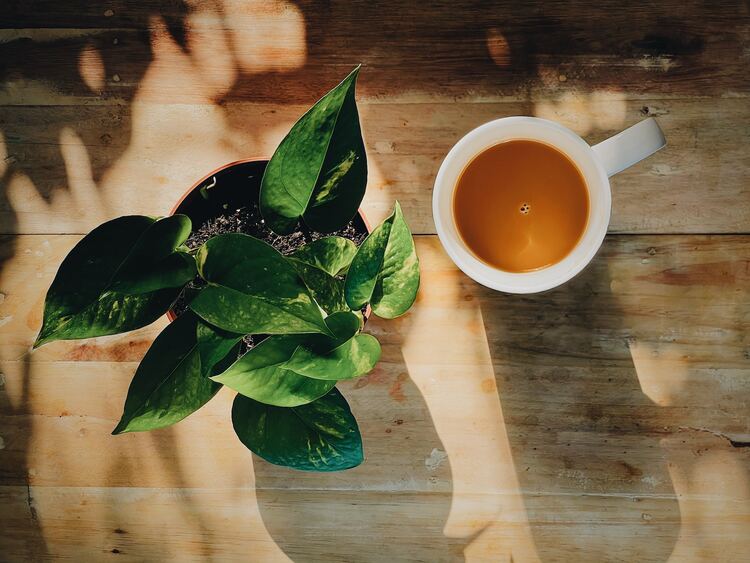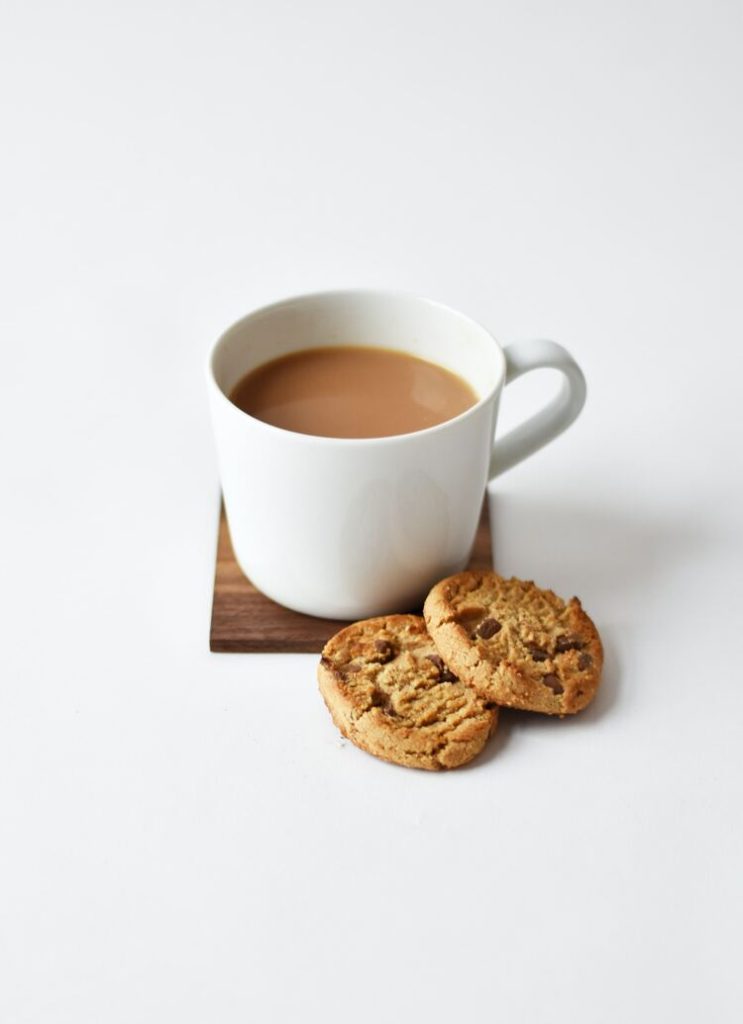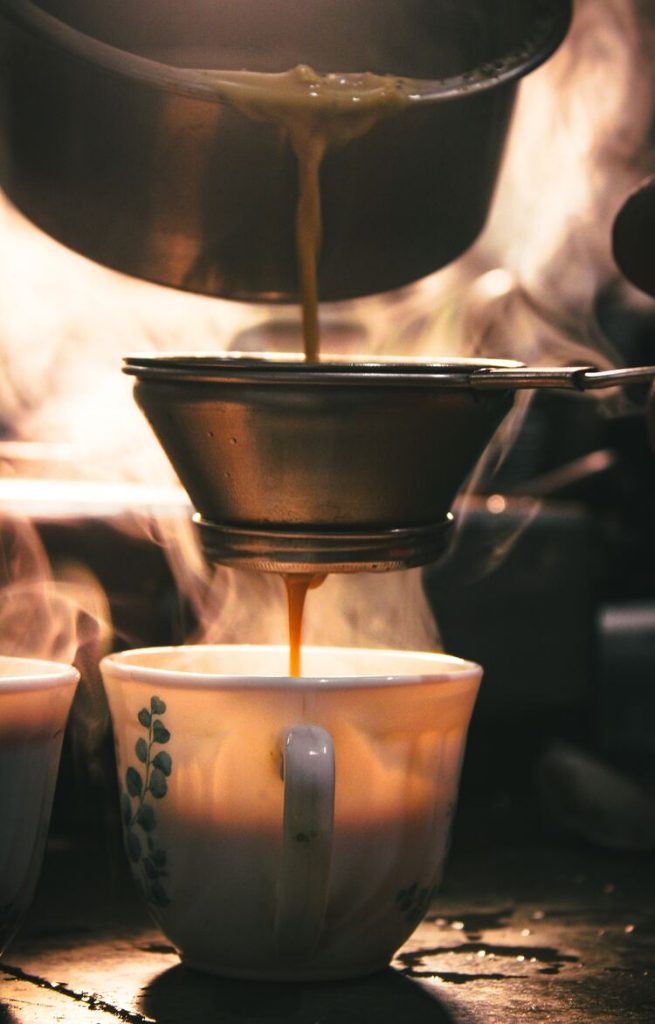Does chai tea have caffeine?
Yes, chai tea typically contains caffeine. Chai tea is made by brewing black tea with a mixture of spices such as cinnamon, cardamom, ginger, and cloves, and often includes milk and sweeteners such as sugar or honey.
Since black tea is the base of chai tea, it contains caffeine. The amount of caffeine in chai tea can vary depending on the specific blend and brewing method used, but it is generally less than the amount found in a cup of coffee.
In this article, we’ll explore the flavor profile of chai, its caffeine content compared to other teas, and its potential health benefits. Plus, we’ll share tips for making the perfect cup of chai tea. Ready to swap your cup of joe for a warm and spicy cup of chai? Read on!
Please note: This article contains affiliate links, meaning I may earn a commission if you make a purchase by clicking a link. Of course, this comes at no extra cost to you and helps me keep offering readers solid information.

What is Chai Tea?
Chai tea, often called “chai,” is a spiced tea that originated in India. The term “chai” itself means “tea” in many languages, so saying “chai tea” is somewhat redundant. In India, it’s commonly known as “masala chai,” where “masala” means a blend of spices.
Chai is made by brewing black tea leaves with spices, milk, and sweetener. The spices used in chai can vary widely but typically include a combination of ingredients such as:
- Cardamom: This is one of the most essential spices in chai, known for its aromatic and slightly sweet flavor.
- Cinnamon: Adds warmth and a sweet-spicy note to the tea.
- Ginger: Provides a bit of heat and earthiness to the blend.
- Cloves: Contribute a robust and pungent flavor.
- Black Pepper: Adds a subtle kick of spiciness.
Other spices that might be included are fennel, nutmeg, and star anise. The combination of spices can be adjusted to suit personal preferences.
Traditionally, chai is made by simmering the tea leaves, spices, milk, and sweetener on the stove. This process allows the flavors to meld and develop a rich and complex taste. Chai can be served hot or cold and is often enjoyed as a soothing and flavorful beverage.
Flavor Profile
Understanding the flavor profile of chai tea can help you fully appreciate its taste and aroma. The combination of black tea and spices creates a robust, complex, warming, and comforting flavor.
The cinnamon adds a sweet and slightly spicy note, while the ginger adds a bit of heat and zing. The cardamom provides a floral and slightly minty flavor, while the cloves add a hint of earthiness. Finally, the black pepper creates a subtle but noticeable kick that adds depth to the overall taste.
Additionally, the milk used in chai tea adds a creamy and rich texture that balances out the boldness of the tea and spices. Whether you prefer chai tea with dairy or non-dairy milk, adding this ingredient adds a unique flavor profile.
The combination of black tea, spices, and milk creates a complex and flavorful beverage that is beloved by many.

Does Chai Tea Have Caffeine?
Now that we’ve learned about the delicious flavor profile of chai tea, it’s time to dive into its caffeine content.
Chai tea typically contains less caffeine than a standard cup of coffee, but more than most herbal teas. An 8-ounce cup of chai tea brewed with black tea leaves contains around 47 mg of caffeine. This is about half the caffeine in a typical cup of coffee, which contains around 95 mg.
For those looking to limit their caffeine intake, options are available for a decaffeinated version of chai tea. However, it’s important to note that decaf versions may not have the same bold flavor profile as traditional chai tea.
Comparing chai tea to other types of tea, it falls in the middle regarding caffeine content. Green tea typically contains around 35 mg of caffeine per cup, while black tea contains around 60 mg. Herbal teas, on the other hand, are caffeine-free.
In summary, chai tea lands at a moderate level of caffeine content, making it a perfect choice for those who love the flavor of tea but want a little pick-me-up without the same level of caffeine as coffee.
Chai Tea Health Benefits
In addition to its delightful taste and moderate caffeine content, chai tea also offers various health benefits.
For one, it contains powerful antioxidants that can help protect against various diseases and reduce inflammation. Additionally, some of the spices used in chai tea, such as cinnamon and ginger, have been shown to help regulate blood sugar levels and improve digestion.
The black tea used as a base in most chai tea blends also contains compounds that can improve mental focus and alertness, boost physical performance, and even reduce the risk of heart disease. And because chai tea is typically consumed with milk, it can provide a good source of calcium and other essential nutrients.
Incorporating chai tea into your daily routine can be a simple yet effective way to improve your overall health and wellness. So why not try it and see what benefits it can offer you?

How to Make the Perfect Cup of Chai Tea
How do you make the perfect cup of chai tea? Here are some tips to get you started:
Ingredients
- 2 cups water
- 2-3 tea bags or 2 tablespoons loose black tea leaves
- 2 cinnamon sticks
- 8-10 cardamom pods, crushed
- 4-6 whole cloves
- 1-2 inch piece of fresh ginger, sliced
- 1 cup of milk or milk substitute (we are providing a measure here, but add to taste)
- 1-2 tablespoons honey or sugar (optional)
Instructions
- Add water, cinnamon sticks, cardamom pods, cloves, and ginger in a medium saucepan. Bring to a boil over medium-high heat and then reduce heat to low. Simmer for 10-15 minutes, stirring occasionally.
- Add tea bags or loose tea leaves to the pan and let steep for 3-5 minutes, depending on your desired strength.
- Remove the pan from the heat and strain the mixture through a fine-mesh sieve into a teapot or pitcher.
- If desired, add milk, honey, or sugar to the chai tea and stir to dissolve.
- Pour the chai tea into mugs and serve hot.
Experiment with different spices and ratios to find your perfect cup of chai. And remember, the key is to find the balance between the tea, spices, milk, and sweetener to create a harmonious and satisfying blend.
Now, remember that since chai tea is so popular, plenty of ready-to-buy products are in the market (loose leaf, tea bags, powder). We are providing flavor combination ideas below.
Chai Tea Variations
There are many variations of chai tea, each with its unique flavor and ingredients. Here are some of the most popular variations of chai tea:
Masala Chai
This is the traditional Indian version of chai tea, made with a blend of black tea and whole spices such as cardamom, cinnamon, ginger, cloves, and milk. Masala chai is usually sweetened with sugar or honey.

Rooibos Chai
Rooibos chai is made with rooibos tea instead of black tea. It is a caffeine-free alternative to traditional chai tea but still has the same spicy flavor.

Green Chai
Green chai is made with green tea instead of black tea. It is a lighter, less intense version of traditional chai tea.

Vanilla Chai
Vanilla chai is made with a blend of black tea, spices, and vanilla. The vanilla adds a sweet, creamy flavor to the chai tea.

Spiced Apple Chai
Spiced apple chai is made with black tea, spices, and apple pieces. This variation of chai tea has a fruity, spicy flavor.

Chocolate Chai
Chocolate chai is made with black tea, spices, and cocoa powder. Adding cocoa powder gives the chai tea a rich, chocolatey flavor.

Pumpkin Chai
Pumpkin chai is made with black tea, spices, and pumpkin puree. This variation of chai tea is popular in the fall and has a warm, comforting flavor.

Buy on Amazon now!
Besides the delicious flavors above, you can also buy a sampler box to try different varieties.

The taste and numerous health benefits of chai tea make it a great alternative to coffee and other traditional caffeinated beverages. Whether you’re looking for a morning pick-me-up or a relaxing evening treat, chai tea is worth considering.
More About Black Tea
The Process of Making Black Tea
What Does Assam Tea Taste Like?
What Does Darjeeling Tea Taste Like?
What Does Ceylon Tea Taste Like?